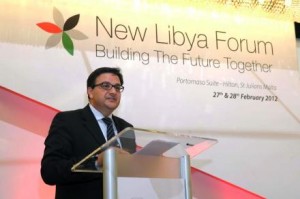By Nafissa Assed.
As elections knock on Libya’s doors, the Libyan people are increasingly frustrated with their interim government leaders. They want, . . .[restrict]among other things, better compensation and greater rights for those who fought Qaddafi’s forces.
They are particularly concerned about the elections. They say they have not been properly consulted and the new rules do not live up to the democratic ideals they had hoped for. Many Libyans are upset and continue with demonstrations because they believe that the government and the NTC have not succeeded in forming a solid and constructive interim government for Libya.
Meanwhile, the victors in Libya’s war have held the reins in Libya since Qaddafi’s death. Weapons are still in the cities and now, instead of being a protection against oppression, threaten the security of Libyans’ lives. Security in Libya is now a major and so far unsolved problem. The presence of multiple militias has led to armed clashes in Benghazi in the east, Sabha in the south and Zuara in the west.
Clearly, the first free elections in over four decades will provide all Libyans the opportunity to exercise their democratic rights and participate in a process which will shape the future of the country. But there is a strong need to raise awareness about the coming elections so that Libyan citizens know what to do when they go to the polls to choose, with a free conscience, what they want.
Unless there is an thorough and well-organized awareness campaign before the elections, as well as carefully thought-out rules to solve the constant clashes between the cities and ensure security within Libya, this contest could end up with frightening results for Libya’s future. The country is controlled by different armed militias everywhere, there’s been no awareness campaigns and there is only two months remaining before the elections. This is cause for serious political alarm.
I’m afraid Libyans may be reluctant to participate in the first free elections set for later in the year if the Supreme National Commission for Elections does not make more of an effort to raise awareness of what is involved in the electoral process. If things remain as at present, there are two possibilities: either Libyans will refuse to go to the polls because they do not know what is required of them, or they may effectively sell their votes to those who have the money. One possibility is as terrifying as the other.
So far the run-up to the elections has been marked by a lack of security. The interim government has been struggling since November to impose its authority on the armed groups and establish security. Unfortunately, this effort has been in vain because the various armed groups are pretty much the ones that have held power in Libya since the liberation.
Besides, even if the Libyan Supreme National Commission for Elections, which will supervise the poll, were doing enough to increase awareness of the electoral process that is scheduled to be on June 19, Libyans’ criticism of the government and the NTC is growing, reflecting frustration with the slowness of progress following the country’s liberation last year.
Obviously the interim government is fearful of postponing the vote which would result in it being accused of trying to make a grab for power, as the military has been accused of doing in Egypt.
So we see the authorities rushing into elections before the country is ready. Abdurrahim al-Kib, Libya’s interim Prime Minister, is determined that the deadline will be met. That could be disastrous. The fact that both Libya and the Libyans are apparently unprepared and ill-equipped for them is quite obvious and hard to deny! You can’t rebuild a country in six months. But delaying the elections would be even more devastating.
The media, too, are not doing all that needs to be done to prepare Libyans for the vote. Nor are the members of the NTC making visits to isolated Libyan towns or getting engaged in pre-election awareness campaigns to explain the approaches, purposes and the vital importance of the poll and how it will shape the future of the country.
Libyans need direct discussions with their leaders about the significance of the elections and their own considerable role in making them a success. They need face-to-face communication so they can feel they are part of the process.
Also, security must be strictly established and the country needs to be united again. What will be proposed in June is the first stage in a new constitution for Libya, and this constitution must not exclude anyone or any political political group, whether Islamic or secular, liberal, Marxist or nationalist. No one should want any group to be eliminated from the electoral process.
However, we are in a position in which there is no effective state or national army or police or security apparatus. This means that those in the street with guns have the full power to do whatever they want to do. The interim government is having a hard time at the moment. The majority of Libyan citizens don’t trust it and virtually every decision taken by it is being criticized. It can’t do much right is the depressing view of the majority of the people.
This might be comprehensible after many years of oppression but, for the long run, it is not be a very constructive way of thinking about rebuilding the country.
Today, Libyans are within reach of a democratic future which one year ago seemed only a far-away dream. Understanding the point, the efforts, and the mechanisms needed to make Libya safe and stable and to unite and enlighten the people concerning the elections is compulsory for the success of the new free Libya elections.
Nafissa Assed has writes for numerous blogs and on-line publications. She is a former Libyan exile who was born and brought up in Morocco. Her father returned in 1990 but was murdered by the Qaddafi regime in Libya. After his death she lived with her grandfather, Mohamed Othman Assed, Libya’s prime minister from 17 October 1960 to 19 March 1963. In 2010, she moved to Libya full-time.
After the Libyan revolution started, she wrote anonymously from Tripoli on what was going on inside the country.
Tweet
[/restrict]





